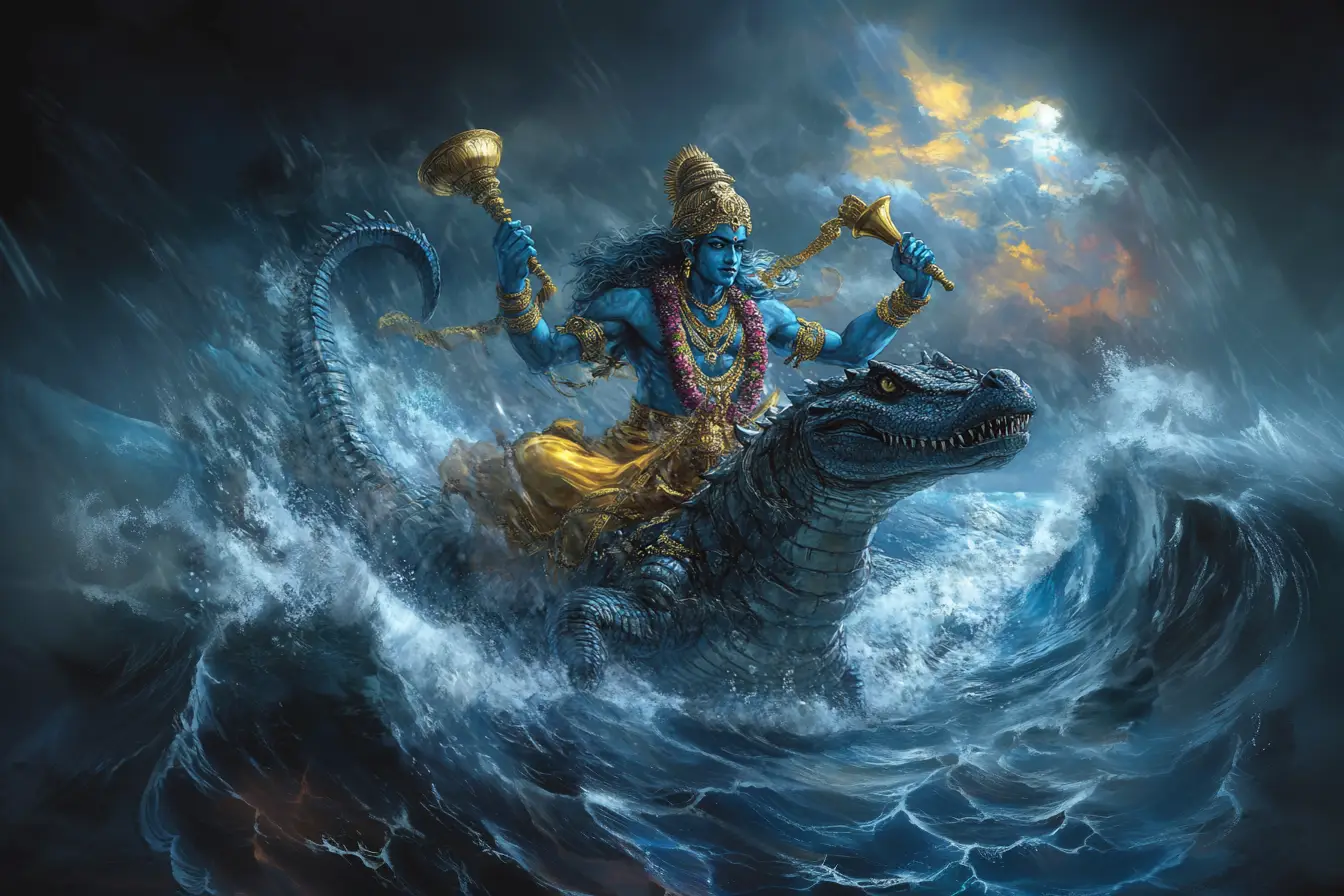Varuna is an ancient and powerful Hindu god that has been worshipped since the Vedic period. He is the god of cosmic order, the sky, and the ocean. He also plays a crucial role in maintaining harmony in the universe.
Origin Story of Varuna in the Vedas
Varuna’s origins can be traced back to India, about 3500 years ago. Then, he was worshipped as the king of the gods and the maintainer of cosmic order. In the early Ridveda texts, Varuna is recognized as the leader of the Asura, although in later Indian texts, he is classified as a Deva.
According to ancient Indian Myths and legends, Varuna is the offspring of Aditi and Rishi Kashyap. His name can be roughly translated as “One who covers or binds.“ This refers to the god’s association with the ocean, which “covers” everything in the beginning of the world.
Family
Varuna’s Father was Rishi Kashyap, and his mother was Aditi. Aditi gave birth to eleven deities known as the Adityas.
These deities include Vivasvan (Surya), Aryaman, Tvashta, Savitr, Bhaga, Dhata, Mitra, Varuna, Amsa, Pushan, Indra and Vishnu (in the form of Vamana).
The Aditya are benevolent gods who act as protectors and guardians of both the physical and spiritual worlds.
Varuna has two wives. The first is Varuni, the goddess of liquor, while the second is Riddi, the goddess of prosperity. He had several sons, including Pushkara, Bala, Sura, and Daksa Savarni Manu.
Physical Appearance and Symbols of Varuna

Artistic depictions of Lord Varuna depict him in various forms. However, his most popular illustration shows him in golden armour and sitting on the Makara, a mythical reptilian sea creature that resembles the modern crocodile.
Like many other Hindu deities, Lord Varuna has four faces and four hands and is often shown holding a noose made from a snake.
Read Also: Why cattle are respected in Hinduism.
It is said that Varuna uses this noose to trap liars and demons (such as Bali and Sanka) in his mansion to prevent them from disturbing the world. Other weapons used by lord Varuna in his fight against evil include Varunastra and the Gandiva.
Sometimes, the deity is portrayed riding a chariot drawn by seven Hiranyapakshas, described as golden-winged birds similar to the flamingo. These birds also serve as messengers for the great god.
Powers and Abilities of Varuna
Control Over Water
Varuna is believed to have complete control over water, including oceans, rivers, rainfall, and other natural elements.
He is responsible for the life-giving properties of water and is often invoked in prayers for rain, especially in times of drought.
The god is also believed to control the weather, direct and redirect rivers, and provide clean water from springs.
Enforcement of Cosmic Order
Varuna is also the Hindu god of the sky and all other cosmic elements. He guides the movement of the Sun and other cosmic elements across the sky and protects the people from lightning and thunder.
God of Oaths and Justice
Varuna and his brother Mitral are responsible for enforcing moral order among humans. He punishes those who break oaths, treaties, and promises.
Varuna is omnipresent and can see everything that happens in the world. The stars represent his eyes, and he constantly watches over the universe. He knows when someone has lied, broken a promise, or committed a sin, and he has the power to deliver justice accordingly.
Healing Powers
Varuna is also associated with health and healing. In ancient India, he was the deity of physicians, and he is believed to have thousands of remedies that cure all kinds of diseases.
The god is sometimes invoked in rituals to cure illnesses and to purify both the body and soul.
God of the Underworld.
Varuna is also associated with the underworld. However, the underworld is considered to be under the authority of Lord Yama, the Hindu god of death and the afterlife.
During the Veda period, Varuna was believed to be involved in guiding the souls of the dead to the afterlife. It is also said that he can grant immortality to deserving souls.
Varuna in Later Hinduism
As Hinduism evolved over time, Varuna’s prominence gradually diminished. By the time of the Puranas and the rise of devotional traditions, other deities like Vishnu and Shiva gained more prominence.
However, Varuna’s influence did not disappear entirely. Today, he is still worshipped as a guardian of water and a protector of those who travelled by sea. There are also several festivals dedicated to him.
These include Cheti Chand, Chaliya Sahib, Narali Poornima, and the Raksha Bandhan festival.
Best ways to worship Varuna
Here are five traditional ways to worship Varuna:
1. Perform Water Rituals: Fill a pot with water, add a little bit of milk, honey, uncooked rice and jaggery to the water, and place the pot on the northeast side of the home on a red cloth.
2. Chant Varuna Mantras: Regular recitation of mantras associated with Varuna helps connect with Varuna’s divine energy and seek protection and order. The mantra should be chanted 180 times.
3. Offerings of Pure Water and Flowers: Present clean water, lotus flowers, or white flowers like jasmine to Varuna as offerings.
4. Tarpana Rituals (Water Offerings): Perform Tarpana by offering water in Varuna’s name to honour ancestors and the cosmic order, seeking balance and harmony.
5. Fasting on Varuna Worship Days: Observing fasts, especially on auspicious days like Purnima (full moon), is a way to express devotion and seek Varuna’s blessings for purification.
Benefits of Worshiping Varuna
It is believed that those who are devoted to Varuna will be blessed with good health. Families who have lost a member to drowning are also advised to devote themselves to Varuna for blessings.

Hi where can I get the high definition images you used for the Varuna god of sky and water article ?
Hello, The images were generated with Ai. Midjourney to be precise.